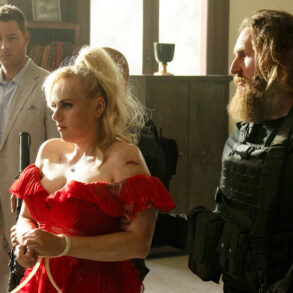I was lying in bed a few nights ago when it came to me. Totally out of the blue, the words Sword of Vermillion appeared plastered in my mind’s eye like a billposter for a Christmas pantomime starring an unlikely cast of long-forgotten TV personalities. Sword of Vermillion, my goodness, it’s been a while. I first played the Sega Mega Drive (Genesis if you’re reading this Stateside) role-playing game in late 1992, and, even at just six-and-a-bit years old, was blown away by how sophisticated it felt. Against the likes of Sonic the Hedgehog, ToeJam & Earl, Golden Axe, and the various other start here-finish-there 16-bit side-scrollers of the day, it felt like there was just so much to see and do in this world.
At the time, Sega certainly thought so – ambitiously marketing its in-house RPG as a 300-hour experience. Even the blurb on the back of the game’s case promised “hundreds of hours of adventure gameplay!” And while I’ve no idea how many hours I personally sank into the game almost three full decades ago, I do know it must have cost my dad a small fortune in rental fees, with me borrowing it from our local Blockbuster Video for two days every week for well over a year.
Since then, I’ve spent hours of my life absentmindedly searching Google, old forums and social media in a desperate bid to remember the name of my long lost console love from all those years ago, but have always come up short. I can’t explain how the mind works, or why my brain decided to remind me without warning the other day, but it did. And now I’m replaying Sword of Vermillion on PC via Steam, and it’s as if I’ve torn a hole in the space-time continuum.
Alone in the dark

“Your father is in his grave,” says the chambermaid who presided over my dad’s deathbed moments ago. I’d only nipped out to the shop to grab some green herbs, and suddenly not only has my old man shuffled off this mortal coil, he’s been carted down to the cemetery and planted six-feet under without so much as a goodbye. What the actual fuck, I think to myself, as I study the egregious eight-option menu that appears before every single interaction, all the while pondering if selecting Talk, Magic, Equip or Take will make anything here make sense.
It rarely does. And as one of the first-ever RPGs to feature on Sega’s Mega Drive/Genesis console, it’s now my understanding that certain facets of the old school role-playing scene reckon Sword of Vermillion has long punched above its weight. First launched in Japan in 1989, North America the following year, and in Europe the year after that again, Sword of Vermillion was developed by Sega AM2 – the team led by Yu Suzuki and collectively responsible for Out Run, Hang-On, and in later years, Virtua Fighter, Virtua Racer and the Shenmue games.
Let’s be clear: the 300-hour assertion is unquestionably bullshit (it’s probably closer to 20); but the game’s awkward design choices definitely broaden the scope for getting lost, therefore inadvertently piling extra time onto the clock. I’m not here to shit on an RPG that’s old enough to drive two times over, but I will say it’s easier to spot its flaws when playing as an adult who went on to thrive in Suikoden, Alundra, and Chrono Trigger – the latter of which, of course, was powered by hardware of similar stature.
Towns and villages in Sword of Vermillion are a delight, to be fair, littered with genre-staple locales in the shape of inns, item shops, and weapon and armor stores. Whimsical NPCs fill the thoroughfares, many of which boast dynamic, reactive dialogue tied to whatever major event has most recently unfolded. It’s when you step beyond the boundaries of the burgs and boroughs, however, that things begin to go awry. The game’s open world UI, for example, looks like this:

On the left is a first-person Doom-like screen wherein you move towards out-of-sight goals that are rarely easy to find. On the right, I, well, don’t really know what’s going on there. It’s supposed to be some sort of to-scale articulation of your location and direction at any given time (I think), but it’s far more confusing than it is helpful. Especially when you stumble into dungeons without a torch and are met with this:

While fumbling around in the dark in those instances, you’ll invariably trigger the game’s random battles, which transport you into beat ’em up-esque arenas where the quickest path to success is hammering attack and slashing everything that dares breach your personal space. Often, that’s hostile and indistinguishable Dragon Quest-aping blobs.
Despite all of this, six-and-a-half-year-old me did not care. I fucking loved every single minute of it. In 1992, my experience of sprawling role-playing games was clearly limited, but I was so taken with chatting to every single idle civilian walking the same four squares forward and four square back; I was obsessed with trying to find something in the opaque open world; and I loved battering A, B and/or C while chopping down scores of faceless baddies.

It’s no surprise, then, that the RPG genre quickly became my favorite in my formative years. Sword of Vermillion was my first taste, paving the way for the aforementioned Suikoden, Alundra and Chrono Trigger; as well as Suikoden 2, Final Fantasy 7, Final Fantasy 8, Final Fantasy 9, Final Fantasy 10, Xenogears, Legend of Dragoon, and Breath of Fire 3, all in the space of the next 10 years. I might have discovered these games over the course of time anyway, but my affinity for RPGs started with Sword of Vermillion, and for that I’m grateful.
Taking Sword of Vermillion for a spin in 2023 for less than a dollar (£0.79 / $0.99 cents) has let me live it all over again, warts and all, for a lot less money than it cost me (my dad) the first time around. Blockbuster Video is no longer with us, despite my best efforts in the early ’90s, but I’m delighted to reunite with the long lost favorite that for me started it all. The first cut is the deepest, so sings Cat Stevens, and with my latest discovery I’m happy to let that wound finally heal.
Live out your wildest medieval/steampunk/cyberpunk/insert favorite sub-genre power fantasies with the best RPGs
This post was originally published on this site be sure to check out more of their content.





